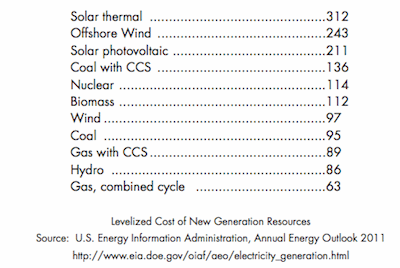The Register 5/4/11
Renowned British-born boffin Freeman Dyson has given a cautious welcome to shale gas – the energy revolution that has caught energy experts, politicians and civil servants by surprise.
"A surge in gas production and use may prove to be both the cheapest and most effective way to hasten the decarbonisation of the world economy, given the cost and land requirements of most renewables," he writes in the foreword to a new report.
Dyson compares shale to the introduction of wax candles, which replaced tallow candles and allowed the poor to read at night for the first time.
"Wax candles did more than government schools to produce a literate working class ... Compared with that, the later change from wax candles to electric light was not so important."
New reserves of gas extracted from rocks that lie much deeper than gas fields, have had a dramatic effect on the energy market in recent years. The global price of gas and oil have diverged for the first time, and the US is now a net gas exporter. Countries previously dependent on imports, such as Poland, South Africa, Mexico and Argentina, should become self-sufficient if they exploit their resources.
The report, written by science writer Matt Ridley, was commissioned by the Global Warming Policy Foundation; Dyson sits on the Board.
Ridley notes that the shale gas is a combination of old techniques and new computer processing power. Fracturing rock and horizontal drilling are not new, but have improved considerably; 3D geological modelling has allowed the sources to be exploited with greater precision.
"Though oil may yet grow more scarce and costly during this century, there is no realistic prospect of the world 'running out' of coal or gas this millennium. Like the peak-oil theory of the 1970s (when Jimmy Carter, influenced by EF Schumacher, argued that oil could be used up within a decade) and the peak-coal debate of 1865 (when WE Gladstone, influenced by WS Jevons, argued that Britain should retire its national debt before its coal ran out), all these forecasts proved to be far too pessimistic," he writes.
Ridley does highlight a few counter arguments. Geologist Art Berman wonders why one-third of shale wells drilled in the past "four to six" years are already abandoned; advocates say they should last 40 to 50 years.
However, many of the environmental impact reports have been disproved, or are much less impactful than campaigners suggest: drilling doesn't spoil the countryside, doesn't use much water, and doesn't require subsidising.
He also notes that "powerful and entrenched interests" – from nuclear power giants to existing natural gas suppliers such as Gazprom, and the environmental lobbies – are working against the advancement of shale gas as a energy source. But the clincher, Ridley suggests, is its low cost:
"Ultimately, it will be a matter of whether overborrowed European governments, businesses and people will be able to resist such a hefty source of new revenue and a clean energy source requiring no subsidy."
Dyson agrees. Shale gas is still a "fossil fuel", but it's much cleaner than coal. China alone creates half of the world's coal-fired energy (EIA stats), and these aren't going to go away any time soon.
"It undoubtedly carries environmental risks, which may be exploited to generate sufficient public concern to prevent its expansion in much of western Europe and parts of North America, even though the evidence suggests that these hazards are much smaller than in competing industries."

Costs of energy production c.2016
By contrast, solar and wind renewables are between many times more expensive and require direct and indirect subsidies, typically burdening the poor with higher fuel bills. Unless renewable technology improves dramatically, most may simply prove themselves to be unaffordable.
You can read the full report here (36-page/1.6MB PDF). ®
No comments:
Post a Comment